Chinese Nationalist Party (KMT) Chairwoman Hung Hsiu-chu (洪秀柱) yesterday said that she would resign at the end of the month.
Hung made the announcement during the weekly KMT Central Standing Committee meeting over which she presided, after thanking her colleagues for supporting her over the “toughest” year in the party’s history, referring to the party’s massive defeat in last year’s presidential and legislative elections.
Hung said that she would step down as KMT chairwoman on June 30 — even though her term is set to expire on Aug. 20.

Photo: Chen Chih-chu, Taipei Times
Hung is on leave until June 30 and yesterday appointed KMT Central Committee Deputy Chairman Lin Cheng-tse (林政則) as acting party chairman.
The announcement came after she and KMT chairman-elect Wu Den-yih (吳敦義) on Friday last week settled a weeks-long dispute and agreed to jointly nominate candidates for the KMT Central Committee elections.
She urged Wu to assume office as soon as possible so that he could make appointments to fill vacancies in KMT headquarters.
“We are very perplexed by the transition necessary for settling the KMT’s affairs. I hope that chairman-elect Wu Den-yih would make suitable appointments and complete the transition soon,” she said.
She said the staffing of the KMT Administration and Management Committee, which manages the KMT’s assets, is particularly urgent, as the KMT is entangled in several lawsuits with the Ill-Gotten Party Assets Settlement Committee, and numerous issues about the KMT’s assets need clarification.
She said that after last month’s KMT chairperson election, she had heard rumors that some KMT members wanted her to step down earlier than scheduled — which she had been prepared to do with the proviso that the KMT’s national congress be pushed forward from Aug. 20 to July 1, so that the transition of unfinished tasks could also be carried out sooner.
Hung said she hoped Wu could aspire to greater achievements than she did and lead the KMT to a brighter future.
Hung asked Lin to chair the meeting in her place and walked out, declining requests from some committee members to shake hands.

Alain Robert, known as the "French Spider-Man," praised Alex Honnold as exceptionally well-prepared after the US climber completed a free solo ascent of Taipei 101 yesterday. Robert said Honnold's ascent of the 508m-tall skyscraper in just more than one-and-a-half hours without using safety ropes or equipment was a remarkable achievement. "This is my life," he said in an interview conducted in French, adding that he liked the feeling of being "on the edge of danger." The 63-year-old Frenchman climbed Taipei 101 using ropes in December 2004, taking about four hours to reach the top. On a one-to-10 scale of difficulty, Robert said Taipei 101

Taiwanese and US defense groups are collaborating to introduce deployable, semi-autonomous manufacturing systems for drones and components in a boost to the nation’s supply chain resilience. Taiwan’s G-Tech Optroelectronics Corp subsidiary GTOC and the US’ Aerkomm Inc on Friday announced an agreement with fellow US-based Firestorm Lab to adopt the latter’s xCell, a technology featuring 3D printers fitted in 6.1m container units. The systems enable aerial platforms and parts to be produced in high volumes from dispersed nodes capable of rapid redeployment, to minimize the risk of enemy strikes and to meet field requirements, they said. Firestorm chief technology officer Ian Muceus said

MORE FALL: An investigation into one of Xi’s key cronies, part of a broader ‘anti-corruption’ drive, indicates that he might have a deep distrust in the military, an expert said China’s latest military purge underscores systemic risks in its shift from collective leadership to sole rule under Chinese President Xi Jinping (習近平), and could disrupt its chain of command and military capabilities, a national security official said yesterday. If decisionmaking within the Chinese Communist Party has become “irrational” under one-man rule, the Taiwan Strait and the regional situation must be approached with extreme caution, given unforeseen risks, they added. The anonymous official made the remarks as China’s Central Military Commission Vice Chairman Zhang Youxia (張又俠) and Joint Staff Department Chief of Staff Liu Zhenli (劉振立) were reportedly being investigated for suspected “serious

Nipah virus infection is to be officially listed as a category 5 notifiable infectious disease in Taiwan in March, while clinical treatment guidelines are being formulated, the Centers for Disease Control (CDC) said yesterday. With Nipah infections being reported in other countries and considering its relatively high fatality rate, the centers on Jan. 16 announced that it would be listed as a notifiable infectious disease to bolster the nation’s systematic early warning system and increase public awareness, the CDC said. Bangladesh reported four fatal cases last year in separate districts, with three linked to raw date palm sap consumption, CDC Epidemic Intelligence